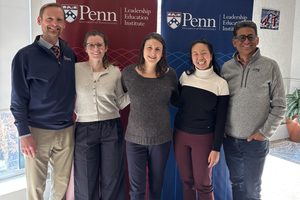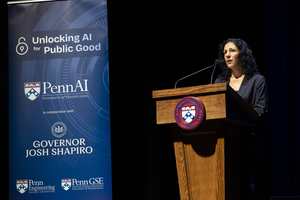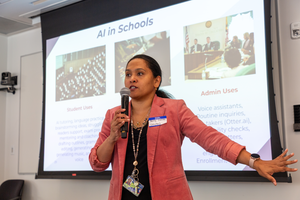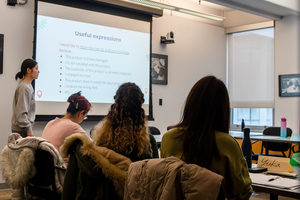
As 2024 comes to a close, it’s time to look back and reflect on a year Penn GSE largely spent looking forward. From launching the School’s new strategic vision, its first in nearly two decades, to developing future-focused programs that prepare educators for AI, many of our stories this year focused on new visions for education. Meanwhile, one story highlighted a project that looks back at the history of West Philadelphia — an endeavor that itself could yield important lessons for our future.
Whether it’s weighing in on the impact of Pennsylvania school funding after a momentous court decision or highlighting strategies to sustain and diversify the teaching workforce, Penn GSE is laying the groundwork to tackle what comes next for education both locally and globally.
Our Picks
1. Penn GSE launches first strategic vision in nearly two decades
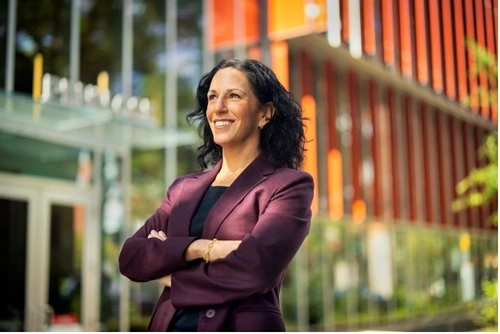
Penn GSE Dean Katharine Strunk introduced Together for Good, a strategic vision focused on educator preparation, equity, innovation, and democracy’s relationship with education. Developed through hundreds of conversations with faculty, students, and alumni, the plan emphasizes cross-sector collaboration and actionable research to solve real-world challenges. Key initiatives include stronger partnerships with the School District of Philadelphia, an AI-focused online degree program, and seed grants for faculty-led interdisciplinary projects.
2. Penn GSE launches Ivy League’s first-ever AI degree program in education

Set to begin in fall 2025, Penn GSE’s Learning Analytics and Artificial Intelligence M.S.Ed. program is the Ivy League’s first master’s degree focused on AI in education. The program equips professionals with expertise in AI-driven technologies, data analytics, and ethical applications to enhance teaching and learning environments.
“Our program addresses the need for practitioners and scholars who can build AI-driven learning systems that support teachers rather than disempower them,” said Professor Ryan S. Baker. Dean Katharine Strunk added that the initiative reflects Penn’s dedication to integrating cutting-edge technology with impactful educational research on a global scale.

Research from Penn GSE’s Center for Benefit–Cost Studies of Education, led by Associate Professor Brooks Bowden, highlighted the potential impact of a $5.1 billion education funding plan aimed at addressing inequities in Pennsylvania’s school system. The research, which factored into Pennsylvania lawmakers’ conversation around the proposal, outlined significant expected benefits, including increased high school graduation rates, higher college enrollment, and the creation of over 18,000 new K–12 education jobs statewide.
4. Penn Literacy Network aims to shake up tutoring industry with innovative partnership

The Penn Literacy Network (PLN) has partnered with Thinkist, a public benefits corporation, to transform peer tutoring in rural Pennsylvania through a four-year, $2.2 million federal grant. Led by Executive Director Lara Paparo, the initiative trains high school juniors and seniors to tutor middle school students while developing essential social–emotional and leadership skills.
5. Penn GSE alum’s Financial Viability Index shines in Philadelphia Inquirer investigation

Penn GSE alum Julee Gard created the Financial Viability Index, a tool that assesses the financial health of small, tuition-dependent colleges using eight key metrics. The index provides actionable insights to help institutional leaders strengthen long-term financial sustainability. Working with the Philadelphia Inquirer, Gard used the Index in an in-depth investigation into the financial health of 13 small, private colleges in the Philadelphia region.
6. Five tips for dealing with the new FAFSA

With FAFSA delays posing challenges, Laura Perna offers practical advice for families applying for financial aid. Her tips emphasize early preparation, seeking support from counselors, and tracking scholarship deadlines to ensure students access critical resources to reduce college costs. She also provides information on some resources that can help.
7. Penn GSE announces LEED Gold certification on Earth Day

Penn GSE’s newly expanded and renovated building has achieved LEED Gold certification for its environmentally sustainable design and energy efficiency. The project, which connected Penn GSE’s main building with Stiteler Hall, features green roofs, energy-efficient lighting, and water-saving systems, resulting in a 40% annual energy savings.
8. With Project SHARPE, Penn GSE’s Daché documents reparations in higher ed

Associate Professor Amalia Daché co-leads Project SHARPE (Slavery Histories and Reparations in Postsecondary Education), studying how universities address historical ties to slavery. The initiative tracks institutional efforts, surveys students of African descent, and builds a public database to foster transparency and change.
9. As teacher shortages rise, experts share tailored solutions
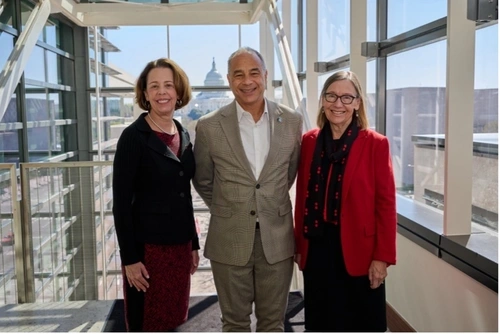
Amid rising teacher shortages, Penn GSE experts emphasize localized and innovative solutions, from “Grow Your Own” programs and teacher residencies to loan forgiveness and career ladders. At a national conference, former Dean Pam Grossman and Associate Professor Sarah Kavanagh highlighted strategies to sustain and diversify the teaching workforce.
10. The West Philadelphia Collaborative History Project chronicles a community’s past

Led by Professor Emeritus John Puckett, the West Philadelphia Collaborative History Project documents the area’s rich history through an interactive online archive. Featuring landmarks, civil rights icons, and evolving demographics, the project serves as a resource for students, scholars, and the public.
Most Shared/Top Social Media Reach
1. Celebration of Educators 2024 explores the economics of education and honors alumni
Penn GSE’s 2024 Celebration of Educators featured a panel on education policy and funding with Dean Katharine O. Strunk, Associate Professor Rachel Baker, and Assistant Professor Ericka Weathers. The event also recognized outstanding alumni, faculty, and students for their impactful contributions to education and community leadership.
2. Penn GSE professors named to 2024 RHSU Edu-Scholar Public Influence Rankings list
Eight Penn GSE faculty members were named to Education Week’s 2024 RHSU Edu-Scholar Public Influence Rankings, highlighting their influence on education policy and research. The rankings underscore Penn GSE’s role in driving critical conversations on equity, innovation, and social change.
Our announcement of the policy brief mentioned in Our Pick 3 above garnered attention from Pennsylvania media, with stories featuring the work of Bowden’s team running in the Philadelphia Inquirer, KYW Newsradio, and Spotlight PA. The research also caught the eye of Pennsylvania lawmakers, impacting the conversation in the state capitol around the proposed legislation.
4. 10 tips for achieving a more diverse faculty
Assistant Professor Damani White-Lewis offers evidence-based strategies to advance faculty diversity in higher education. While these tips came in the waning days of 2023, they would go on to make a bigger splash early this year. Recommendations include widening hiring priorities, forming diverse committees, and balancing selection criteria to address systemic inequities and foster inclusive hiring practices.
5. Penn GSE launches first-of-its-kind professional development program on artificial intelligence
Penn GSE has partnered with the School District of Philadelphia to launch PASS (Pioneering AI in School Systems), a professional development program equipping educators with AI tools to personalize instruction and enhance learning. Set to begin in March 2025, PASS aims to prepare students for a tech-driven future while fostering equity and innovation in classrooms.
Media Inquiries
Penn GSE Communications is here to help reporters connect with the education experts they need.
